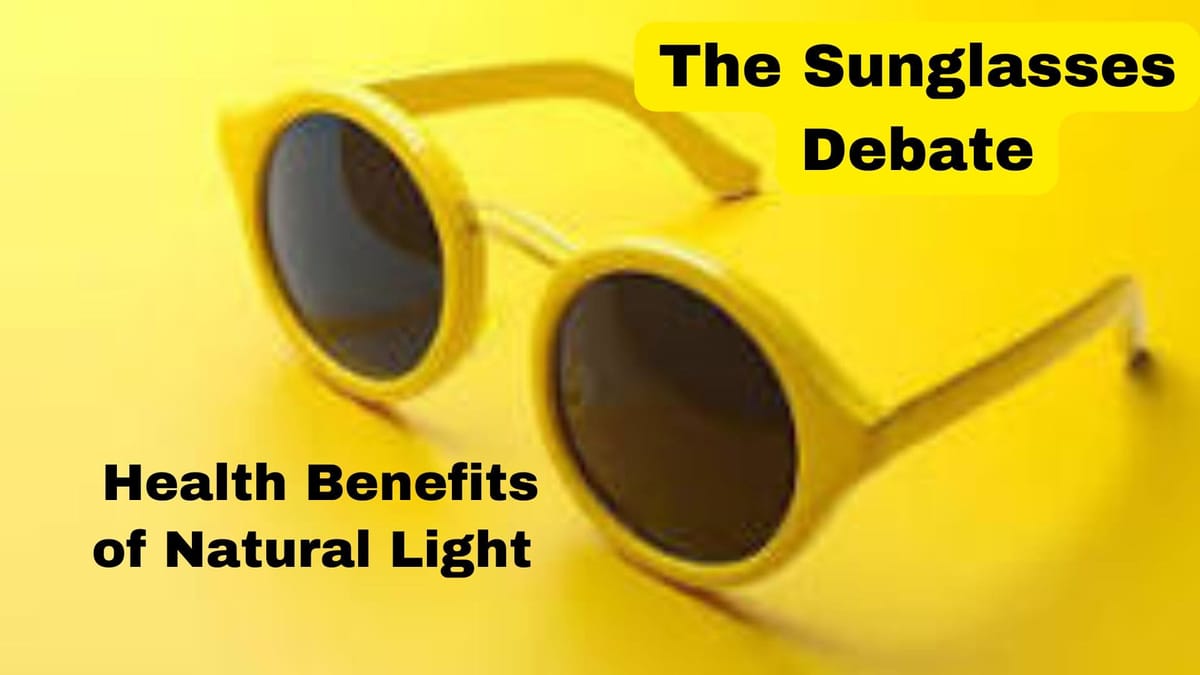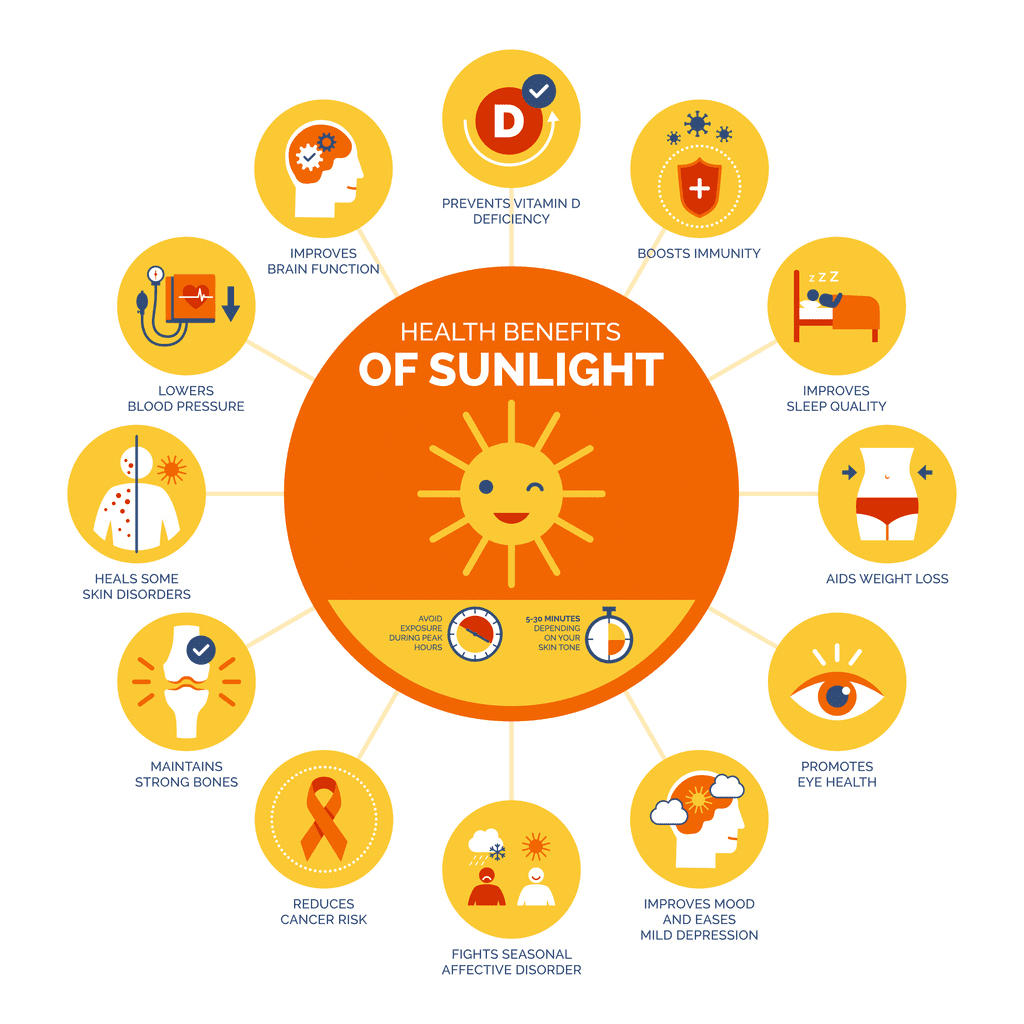The Sunglasses Debate: Unveiling the Health Benefits of Natural Light
Instead of automatically reaching for sunglasses whenever we step outside, we should consider embracing natural light more often, especially during softer morning or late afternoon hours. Doing so may unlock health benefits for our eyes, brain, and overall well-being.

In recent years, a growing body of research has challenged the long-held belief that sunglasses are an essential accessory for eye health. Experts are increasingly recommending that we reconsider our relationship with sunglasses and embrace the potential benefits of natural sunlight. This article delves into the latest findings on how sunlight affects our eyes, brain, and overall health, exploring the advantages and potential risks of ditching our shades.
The Power of Sunlight: More Than Meets the Eye
Is Sunlight Good for the Eyes?
Contrary to popular belief, moderate exposure to natural sunlight can have several positive effects on eye health:
- Myopia Prevention: Studies have shown that spending time outdoors in natural light can help prevent the development and progression of myopia (nearsightedness), especially in children. The bright outdoor light stimulates the release of dopamine in the retina, which may inhibit abnormal eye growth associated with myopia.
- Circadian Rhythm Regulation: Natural light exposure, particularly in the morning, helps regulate our circadian rhythm. This internal biological clock is responsible for various physiological processes, including melatonin production for healthy sleep patterns and overall eye health.
- Vitamin D Synthesis: While the eyes themselves don't produce vitamin D, exposure to sunlight triggers its production in the skin. Adequate vitamin D levels have been linked to a reduced risk of age-related macular degeneration and other eye conditions.
- Light Adaptation: Regular exposure to varying light intensities helps our eyes maintain their ability to adapt to different lighting conditions, potentially reducing eye strain and fatigue.
Is Sunlight Good for the Brain?
The benefits of sunlight extend beyond eye health, positively impacting our brain function and mental well-being:
- Mood Enhancement: Sunlight exposure increases the production of serotonin, often called the "feel-good" neurotransmitter. This can help alleviate symptoms of depression and seasonal affective disorder (SAD).
- Cognitive Function: Some studies suggest that exposure to natural light can improve performance, including memory, attention, and problem-solving skills.
- Neuroplasticity: Sunlight may promote neuroplasticity, the brain's ability to form new neural connections, potentially aiding learning and recovery from brain injuries.
- Melatonin Regulation: Proper light exposure helps regulate melatonin production to maintain healthy sleep-wake cycles and overall brain health.
Photosensitive cells in the eye directly affect the brain’s hypothalamus region, which controls our biological clock. This influences our circadian rhythm for normal sleep patterns, hormone regulation, increased reaction time, and behaviour. Most cells in the body have an important cyclic pattern when working optimally, so many organs can falter and become diseased without adequate sun. This includes diseases like cancer, diabetes, and heart disease.
The hypothalamus also regulates the combined actions of the nervous and hormonal systems.
Among the specific effects of the eye’s photosensitive cells are helping you get out of bed each morning. The transition from sleep to waking requires the effects of the body’s adrenal glands, influenced by the brain’s hypothalamus and pituitary. Exposure to morning sunlight also helps raise body temperature to normal (after a slight reduction during sleep), and numerous brain activities including increased alertness and better cognition—helping mood and vitality. These changes are often not experienced in many people until their morning coffee kicks in. Taking a peek outside at the dawn’s first sunlight is a habit worth implementing.
Inside lighting may provide some eye stimulation if your light bulbs are the full spectrum type But they will not replace the regular habit of getting morning sun into unshielded eyes. This routine is even more important with age.

How Natural Light Affects Your Vision and Overall Health
The impact of natural light on our bodies goes far beyond what meets the eye:
- Visual Acuity: Some researchers suggest that exposure to natural light may help maintain and improve visual acuity over time.
- Colour Perception: Natural light provides the full spectrum for accurate colour perception and overall visual quality.
- Hormone Balance: Sunlight exposure affects the production of various hormones, including cortisol and melatonin, which play roles in stress management, sleep, and overall health.
- Immune Function: Moderate sun exposure can boost the immune system by increasing the production of white blood cells and enhancing the body's ability to fight infections.
- Bone Health: Sunlight-induced vitamin D production is crucial for calcium absorption and maintaining strong bones and teeth.
The Sun, UV Light, and Your Eyes
While the benefits of sunlight are becoming increasingly recognized, it's essential to understand the role of UV light and its potential risks:
- UV-A and UV-B: Of these two types of ultraviolet radiation that reach the Earth's surface, UV-B is more energetic and potentially harmful but is mostly absorbed by the ozone layer. UV-A penetrates deeper into the eye and skin.
- Natural Protection: The eye has several natural defence mechanisms against UV radiation, including the blink reflex, pupil constriction, and the absorption of UV light by the cornea and lens.
- Hormesis: Some researchers propose that controlled, moderate exposure to UV light may trigger beneficial adaptive responses in the eye, potentially strengthening its natural defences over time.
- Potential Risks: Excessive UV exposure can contribute to conditions such as cataracts, pterygium, and in extreme cases, photokeratitis (sunburn of the eye). However, these risks are typically associated with prolonged, unprotected exposure in high-UV environments.
Should Children and the Elderly Also "Ditch" Sunglasses?
The question of whether children and the elderly should forgo sunglasses is complex and depends on various factors:
Children:
- Myopia Prevention: Increased outdoor time without sunglasses has been strongly linked to a reduced risk of myopia development in children.
- Eye Development: Natural light exposure during childhood may be crucial for proper eye development and the establishment of healthy circadian rhythms.
- Vitamin D: Sunlight exposure is vital for children's vitamin D synthesis, supporting overall growth and development.
- Caution: While encouraging outdoor time, parents should be mindful of excessive exposure during peak UV hours and in high-altitude or reflective environments (e.g., snow, water).

Elderly:
- Cataract Concerns: Older adults may have an increased risk of cataracts, which can be exacerbated by UV exposure. However, moderate, protected exposure may still offer benefits.
- Circadian Rhythm: Natural light exposure can help maintain healthy sleep-wake cycles, which often become disrupted in older adults.
- Vitamin D: The elderly often have reduced vitamin D synthesis, making controlled sun exposure potentially beneficial for bone health and immune function.
- Individual Assessment: The decision to wear sunglasses should be based on health conditions, medications, and lifestyle factors.
Ageing reduces the ability to benefit from sun stimulation through the eyes, mostly due to eye-related disease development, especially problems such as glaucoma and cataracts. Chronic inflammation and carbohydrate intolerance are two common problems associated with these and other eye illnesses.
Up to 70% of people aged 65 and older have chronic sleep disturbances, with potentially any of the other health problems mentioned above. Light deficiency, whether due to improper timing, suboptimal spectrum or insufficient intensity, may contribute to medical conditions commonly assumed to be age-related inevitabilities.

Pros and Cons of Wearing Sunglasses
Pros:
- UV Protection: High-quality sunglasses can block harmful UV rays, reducing the risk of certain eye conditions.
- Glare Reduction: Sunglasses can improve visual comfort in bright conditions, especially for activities like driving.
- Eye Strain Prevention: Sunglasses can reduce squinting and eye fatigue in bright environments.
- Wind and Debris Protection: Sunglasses are a physical barrier against wind, dust, and debris.
- Fashion and Confidence: For many, sunglasses are a fashion accessory that can boost confidence and style.
Cons:
- Reduced Light Exposure: Wearing sunglasses too often may limit the beneficial effects of natural light on eye health and circadian rhythms.
- Vitamin D Deficiency: Overuse of sunglasses, especially combined with excessive indoor time, can contribute to vitamin D deficiency.
- Impaired Light Adaptation: Constant use of sunglasses may reduce the eyes' natural ability to adapt to varying light conditions.
- Potential for Dependency: Some people may become psychologically dependent on sunglasses, feeling uncomfortable without them even in moderate light.
- Missed Health Benefits: Overreliance on sunglasses may result in missing out on the potential health benefits of moderate, unfiltered sunlight exposure.

Frequently Asked Questions
Q: Is it safe to never wear sunglasses? A: While moderate sunlight exposure can be beneficial, protect your eyes in extreme conditions or during prolonged outdoor activities, especially in high-UV environments. The key is balance and being mindful of your specific circumstances.
Q: How long should I spend outdoors without sunglasses each day? A: There's no one-size-fits-all answer, but many experts suggest aiming for at least 30-60 minutes of outdoor time daily, preferably in the morning or late afternoon when UV levels are lower. Listen to your body and avoid discomfort.
Q: Are there alternatives to traditional sunglasses for eye protection? A: Yes, wide-brimmed hats, visors, and UV-blocking contact lenses can protect without completely filtering out beneficial light. Some experts also recommend transition lenses that adapt to light conditions.
Q: Can I get enough vitamin D through diet alone? A: While some foods contain vitamin D, you're unlikely to get sufficient amounts through diet alone. Sunlight remains the most efficient way for the body to produce vitamin D, with just 10-30 minutes of midday sun exposure several times a week often sufficient for many people.
Q: Are there any medical conditions that require consistent sunglass use? A: Yes, certain conditions like albinism, retinitis pigmentosa, and some medications that increase light sensitivity may necessitate more consistent eye protection. Always consult with an eye care professional for personalized advice.
Key Takeaway
As experts unravel the complex relationship between sunlight and human health, the traditional view of sunglasses as an essential daily accessory is being challenged. While they remain important for protection in extreme conditions, the potential benefits of moderate, unfiltered sunlight exposure are becoming increasingly clear.





